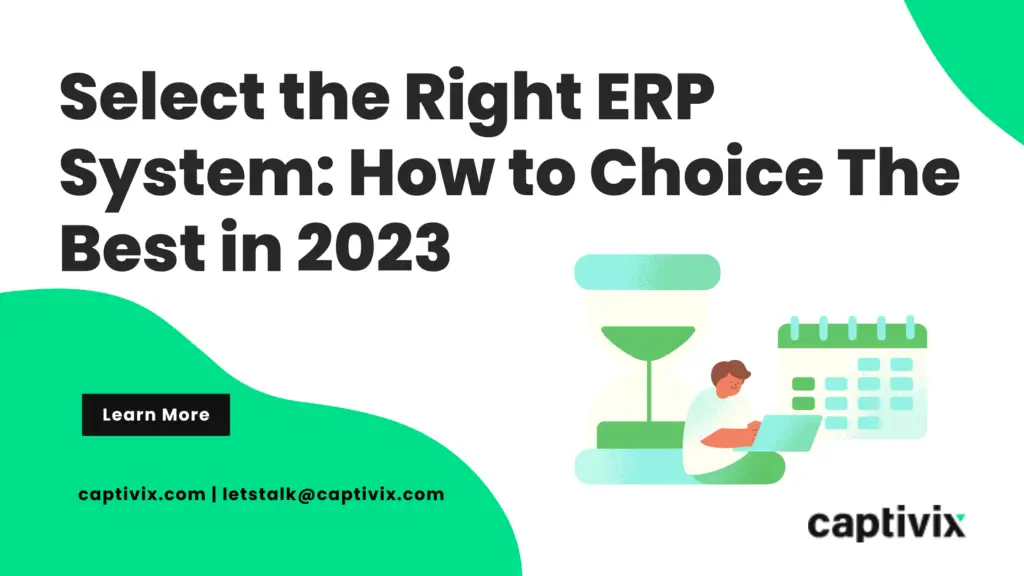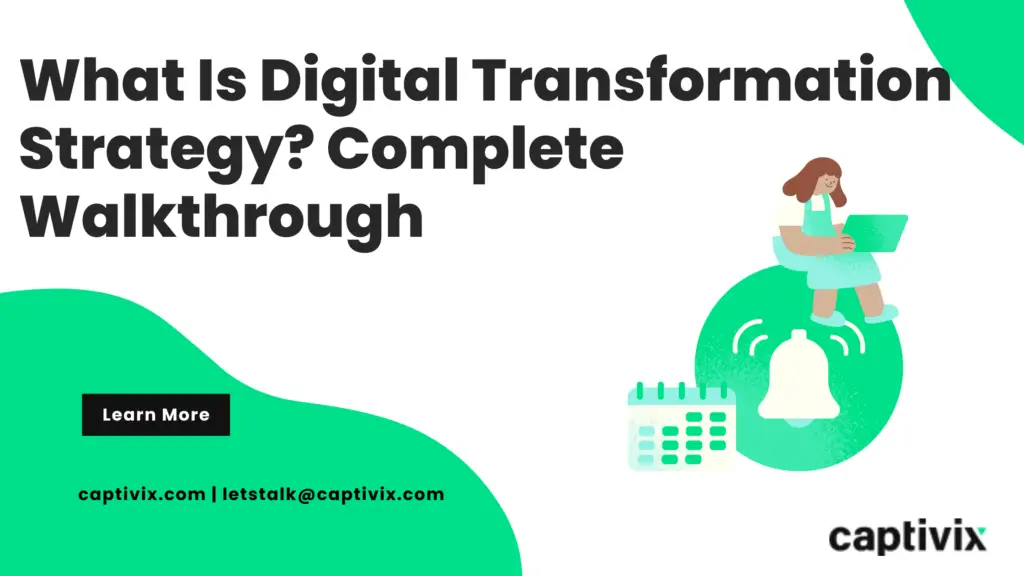Selecting the right ERP system is a hot topic in today’s world of competition in every nook and cranny. As a company, you must know the best way of selecting the right ERP system that works wonders for you. Remember that the success of your business after implementation, will largely depend on how you select the right ERP system for yourself now. Therefore, we are here to help you to select the right ERP system.
In this blog, we will talk about the ways to select the right ERP system along with a list of the 12 best ERP systems, which you may try yourself and choose accordingly.
What is an ERP System?
ERP stands for enterprise resource planning and it refers to the process of planning, customizing and deploying your ERP system. It helps you manage the daily activities of your business and your data and provides you insights into it. When you select the right ERP system, it analyses all your information and saves your time, resources and all the extra effort that you would be using otherwise. If you follow the given advice on selecting the right ERP system, you will see good results flowing from it.
Basic Features You Need
To ensure that you select the right ERP system, you should keep certain basic features in your mind that will help your business in the long run. An ideal ERP solution must have the following features:
- Integration with other applications
- Automation and workflow management
- Business intelligence
- Data analytics
- Reporting and visualization of data
- Custom, granular user and administrative permissions
- Robust databases and data storage
- Compliance and policy management support
ERP: Significance for Businesses
If you want to select the right ERP system for your business, you must know about its significance as well. We have listed the major benefits of an ERP system and why you should select the right ERP system.
I. A More Agile Business
When you select the right ERP system, your business becomes more active. Such a system streamlines the functions of your business, making them more flexible. This also helps you adapt to the forever dynamic conditions of the market as well as the demands of the customers.
Wondering what the benefits of this agility are? Well, this agility can help you cater to the needs or demands of your customers instantly, thereby increasing customer satisfaction. Moreover, you will be in a better position to take advantage of the opportunities that come your way.
II. Enhance Productivity and Efficiency
One good part about an ERP system is that it automates business processes quite efficiently. This automation practically reduces the time and effort that you would be putting in otherwise, to do the task. Now, that means an increase in the overall efficiency as well as productivity for your business. Moreover, this will reduce the burden on your staff and it will be able to focus on more strategic goals.
III. No Unnecessary Costs
One thing you do not want to do is spend unnecessarily. This is where the need to select the right ERP system comes into the picture. The ideal software will streamline your business processes and reduce all forms of manual labour. This practically means that you will be cutting down on the extra costs quite easily!
Moreover, when you select the right ERP system you get real-time insights into your business and you can easily begin with the optimum utilisation of the business operations. This will again slash unnecessary costs.
IV. Better Security and Accessibility
An ERP system is your best bet if you want the security of data. When you select the right ERP system, you get centralized access to all your data which reduces the threat of data loss drastically. Moreover, it helps you prevent unauthorized access and conserve sensitive information.
What else? An ERP system helps you access your data from practically anywhere in the world. You may just do it from any device linked to the software and work from your home, park or even another country!
V. A Professional Partner
This partner is not just any partner, but your very own ERP system. The ideal system acts as a valuable business partner. It also provides you with tools and insights that will help you make informed decisions. You will also get a comprehensive view of your business and will be able to identify the latest trends, with a thorough analysis of data by the system.
VI. Grow Your Business
The best result when you select the right ERP system is this, an end product of all the above benefits. An ERP system can easily support several processes and departments of your business thereby, expanding your operations into new markets and maintaining control over all your data!
Core Modules in an ERP Solution
Some core modules to keep in mind while you select the right ERP system are listed below. To select the right ERP system for your business, you must ensure that it has the following:
- Fiscal and accounting management
- E-commerce management
- Healthcare with inventory management
- Supply chain and order management
- Resource management
- Customer relationship management and marketing automation
- Human resource Management
- Manufacturing
5-step Guide to Select the Right ERP System
It is very important to select the right ERP system for your business. But, the question remains, “How?” Most businesses do not have a clear idea of how to go about the entire process and therefore, we are here to help you! Here is a five-step guide on how to select the right ERP system:
a. Plan for an ERP
The first step to selecting the right ERP system for your business is planning, where you visualize how the system will work as per the needs of your business. This will be crucial in understanding the long-term goals of your company and strategizing for the same.
In this stage, you will need department representatives or heads, who will give you an account of the needs of each section. This will enable you to understand your own needs better. Remember that an ideal ERP meets both, your current as well as expected needs.
b. Analyze Other Solutions
As the next stage to select the right ERP system, you need to analyze the several ERP solutions available in the market. To begin with, you should ask yourself some important questions:
- How big is my company?
- Does the solution have the capability to meet our needs?
- What is my budget?
You may then begin your research or higher an experienced consultant to do so for you. This individual will act as the leader, who will help your business sail through the entire process swiftly.
c. Identify Solutions to Test
You should start testing the ERP solutions, which you have shortlisted now. Ideally, this list should be short enough of let’s say 3-4 ERP solutions. Once you have the list in hand you may schedule demos with the respective vendors. You may also need multiple product demos from each vendor, so be prepared for this as well.
d. Evaluate the Final Options
You may hire certified system integrators, who have apt experience in the field of ERP. They will be quite good at evaluation and help you complete the task quickly. You may ask certain basic questions to make the task easier:
- Does this meet our needs?
- What is the total cost of ownership for the subsequent years?
- What are the strengths and weaknesses of the system?
- Is it easy to use?
- Is it easy to integrate?
e. Final Selection and Implementation
Once you have evaluated the ERP systems, you will be able to get a clear understanding of which system to choose. With the most ideal system in hand, you may begin your implementation and expect good results from it.
How to Select the Right ERP System?
Many companies’ selection process steps at this potent question, “How do we select the right ERP system?” Choosing the right software can be quite a tiresome task and it is, therefore important to know the ifs and buts. We have enlisted six important points on how to select the right ERP system. You may consider these while you are in the process.
I. Functionalities and Features
It is important to know about the features of the system that you are going to use, to ensure positive results. You must check whether the ERP you have chosen has the desired features and modules or not. For this purpose, you may create a list of expectations, which can be used as a checklist during selection.
If you prioritize financial services, your ERP must comprise accounting processes like the general ledger. You may compare the functionalities of different ERP solutions to get a better understanding of the same. This will ensure a good selection on your end and prevent any problems!
II. Integration
Integration with all your systems is another crucial aspect that the selected ERP must satisfy! There is no point in choosing an ERP that runs on its own, without integrating other functions. You can prevent any hassle by being a bit careful. You must analyze how well your selected ERP integrates with other systems that are at your disposal.
It would not be beneficial if you spend a lot of money on something that does not help you in something as important as data migration. Therefore, it becomes imperative to have the vendors schedule demos for you to analyze all the possibilities yourself.
III. Reputation of Vendor
A smart business owner would never enter into partnerships without doing a background check on the partner. You must apply the same rule to the vendor too when you are about to select the right ERP system. It is important to have someone you can trust, and who is available whenever needed.
You must ensure that you consider the past record of the vendor you are about to sign a deal with. Find out about the experience of the provider and how well-equipped they are. You may also look for references from other businesses, dealing with the same individual, for better stats.
IV. Costs
Cost is an important factor to select the right ERP system for your business. You cannot just overspend on one project and then run out of money! To be sure, you must also ensure that the chosen ERP is not too heavy on your wallet. It would be wise if you have a budget in mind, before starting.
Generally, when you are about to select the right ERP system the costs include the total cost of the system, the cost of implementation and the cost of any additional resources needed. There may be other costs involved, which you may discuss with your vendor. It should be a “value for money” deal.
V. Implementation
The process of implementation is a task that demands a lot from you as well as your team. It is therefore important to keep this in mind. You must understand the implementation process and what it will require from you.
Try to find out about the kind of implementation support that the vendor is offering to you. Research other options before you select the right ERP system, as this is going to be an interesting factor, to be taken care of.
VI. The Future
A wise business owner does not only pay attention to the costs, when they are about to select the right ERP system. They also focus on the future of the company after that. It is important to know about the future of the process as well and understand that the ERP will require support.
It is obvious that the selected system will be like a child, which needs to be taken care of. Therefore, it would be ideal if you are prepared for it. Once you have future plans in mind, things will fall into place eventually.
Select the Right ERP System: Best Practices
You cannot rely on the credibility of any software to select the right ERP system. It is important to have a set of do’s and don’ts in mind, before starting with the process. Therefore, we have listed some key practices to ensure that you choose the best system available.
I. The Right Research and Selection Team
You need a team and not an individual to help you out with the selection. Remember that individual effort wins games, but teamwork wins championships. So, your team is going to be the guiding light for your entire process. This team must comprise individuals having an IT background as well as key stakeholders from the many departments.
This will help you get an insight into the internal demands of your business quite easily. Therefore, when you select the right ERP system for yourself, keep a team in mind as well.
II. Inspecting Current Applications and Workflows
It is quite crucial to be informed about everything that goes on in your business. You must understand what is working for your business and what is not. It is only when you understand the working of your business, that you will be able to make it better and more fruitful.
You may do this through a network audit, which will help you identify the current bottlenecks and security concerns. Once you have the issues in front of you, you can solve them easily. In the end, you can find certain legacy tools that must be replaced, to make the selection easier.
III. Improvements in Data Quality
Once the process to select the right ERP system is over, you will also be focusing on data migration. It would be wise to not try to simply copy the entire data during transformation. This may bring along data problems, errors as well as inefficiencies from the parent system to the new one.
A better option would be investing in data cleansing and employing data quality tools for making improvements, wherever necessary. This will save you from the unnecessary hassle, that you would be facing otherwise and ensure that your final data are more useful.
IV. Prioritizing ERP Modules
You must begin by understanding the pain points of your business and check how effectively most applications perform. It is similar to understanding the working of your business. In most cases, the vendor provides you with a module that helps simplify all your business processes.
When you are about to select the right ERP system, you should ideally invest in only those modules which promise to add value to your company. This will prevent extra costs and be beneficial for you as well.
V. Technical Background of IT Team
Remember that expertise is a better parameter than seniority, as it ensures efficiency in most cases. You should therefore look for experience in the members of your IT team. Generally, such project teams have a technical background, which helps them absorb the functions of the new system quickly.
An analysis will help you understand if you should select the right ERP system ERP with a user-friendly approach, that can be customized easily or not. Understand what customer support looks like before beginning with the process.
VI. Product Demo
When you are about to buy a new dress for yourself, you surely check it out. The same is true of any software, and you must schedule product demos. Your team must set up a demo with a professional in the field of customer experience.
You should also have proper documentation and some important set of questions so that the demo is a fruitful one and you are not left with any doubts in the end. This demo will help you understand if the system will work for you or not!
12 Best ERP Systems in 2023
With all this information, you must be overwhelmed by now. It is obviously a huge task to select the right ERP system. Therefore, here is a list of the top 12 ERP systems as of 2023, in no particular order:
- SAP: This solution eases data processing and the flow of information across departments. It helps your business grow through a “continuous innovation strategy”.
- NetSuite: This is an easily customizable solution, developed by Oracle. It holds the distinction of being the first SaaS company in the world.
- Sage: This solution takes relatively less time for implementation and has a good level of customization. It also offers automatic back-ups to its users.
- Infor: This system is easy to use and offers specific features to owners depending on the kind of industry. If yours is a manufacturing company, you may use it.
- Syspro: It focuses largely on manufacturing and distribution sectors and can be adapted to other industries easily.
- Microsoft Dynamics GP: This solution can convert the information of your clients into valuable stuff and improve your marketing strategy drastically. It ensures low costs as well.
- IFS: It ensures business efficiency, reduces unnecessary costs and provides valuable insights. The solution also comes with task automation.
- Acumatica: This solution comes with a user-friendly interface, cross-module workflows, responsiveness and high adaptability.
- Odoo ERP: This solution promotes compatibility with other systems and centralises all business processes into a single interface.
- ERPNext: This is apt for small businesses and offers developer support for customizations.
- Dolibarr: This solution is quite simple to use and offers a multi-user system.
- Katana: The good part about this system is that it keeps evolving to suit the needs of the business. This helps in developing your business even more.
Conclusion
In this blog, we have highlighted the best tips to select the right ERP system for your company. We have listed out the top 12 ERP solutions that can be of great help to you and your business project. It is quite important to know the hows and whats of ERP selection, to ensure the best results in the end. We hope this helps you out in making a wise decision.
Source link








Leave a Reply